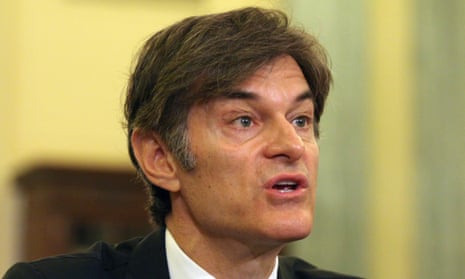A group of prominent American physicians have called on Columbia University’s medical school to sever its links with Dr Mehmet Oz, the popular daytime television host, for “an egregious lack of integrity” and for promoting “quack treatments” not supported by scientific evidence.
In a strongly worded letter addressed to Lee Goldman, the dean of the Columbia medical school, 10 doctors from across the US said: “Dr Oz’s presence on the faculty of a prestigious medical institution … [is] unacceptable.” Oz serves as the vice-chair of Columbia’s department of surgery.
“We are surprised and dismayed that Columbia University’s college of physicians and surgeons would permit Dr Mehmet Oz to occupy a faculty appointment, let alone a senior administrative position in the department of surgery,” the letter continues.
Oz, a renowned cardiothoracic surgeon who trained at the University of Pennsylvania and Harvard, has hosted The Dr Oz Show since 2009. He became famous after appearing on the Oprah Winfrey Show, and pulls in more than 4m viewers every day in the US. His show is broadcast in 118 countries.
Despite his popularity, he has been criticised on multiple occasions for championing questionable products and making unsubstantiated medical claims. A group of Canadian researchers who analyzed The Dr Oz Show found that just 46% of the recommendations made on the show were supported by evidence, and 15% of the advice given contradicted published evidence in medical journals.
Last summer, Oz was called to testify in front of a Senate subcommittee on consumer protection about deceptive advertising for diet supplements, after he touted green coffee bean extract as a “miracle” weight loss product.
Claire McCaskill, the lead senator on the committee, scolded him about the language he used in touting various supplements as “belly blasters” and “mega metabolism boosters”, telling him: “I don’t get why you need to say this stuff because you know it’s not true.”
The company behind the “miracle” green coffee bean extract diet supplement later agreed to pay a $3.5m settlement over false advertising of the product. The study which claimed to prove the weight-loss abilities of the product was retracted after it emerged it was based on fraudulent data.
On his show, Dr Oz has also claimed that children were getting poisoned by arsenic in apple juice, despite the FDA showing otherwise, and has featured discredited research that claims genetically modified foods were harmful to humans. He has also said that his own children would not be vaccinated, though he blamed this decision on his wife’s insistence.
“Dr Oz has repeatedly shown disdain for science and evidence-based medicine, as well as baseless and relentless opposition to the genetic engineering of food crops,” the letter reads. “Worst of all, he has manifested an egregious lack of integrity by promoting quack treatments and cures in the interest of personal financial gain.”
Representatives from the Dr Oz show could not be reached for comment. When asked to comment on the controversy, a spokesperson for Columbia passed along the university’s brief response to the letter, which cited the university’s committment to free speech.
Dear Dr. Miller et al,
As I am sure you understand and appreciate, Columbia is committed to the principle of academic freedom and to upholding faculty members’ freedom of expression for statements they make in public discussion.
Regards,
Doug Levy, chief communications officer
Columbia University medical center
“Whatever his pathology, members of the public are being misled and endangered,” the doctors’ letter concludes.

Comments (…)
Sign in or create your Guardian account to join the discussion